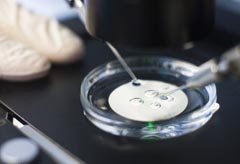Frozen embryos better for IVF treatment, research finds
Frozen embryos lower risks for both mother and baby

Celebrity news, beauty, fashion advice, and fascinating features, delivered straight to your inbox!
You are now subscribed
Your newsletter sign-up was successful
Frozen embryos lower risks for both mother and baby
Using frozen embryos in IVF treatment is more successful than using fresh ones, research suggests.
According to a study by Aberdeen University, using frozen embryos lowers risks for both mother and baby.
Research found that there was less chance of the baby being born preterm and underweight with the frozen eggs. The risk of the baby dying days after birth was also found to be a fifth lower.
There is also reduced risk of bleeding in the mother during the pregnancy.
IVF treatment sees eggs taken from the mother’s ovaries, fertilised, and the healthiest implanted three to six days later, with the remainder frozen for future use.
The study suggests however, that a delay between removing and implanting could increase reliability, as the mother’s womb lining has time to recover from the process of IVF - which includes hyperstimulation of the ovaries to harvest eggs.
Celebrity news, beauty, fashion advice, and fascinating features, delivered straight to your inbox!
It was also claimed that the embryos which survived the freezing and thawing process, showed increased likelihood of a successful pregnancy.
Looking at 11 previous studies of 37,000 pregnancies from IVF treatment, the study by Aberdeen University found that from using frozen embryos there was a one third lower risk of bleeding in the mother during pregnancy, a 30-40% less chance of the baby being underweight, a 20% smaller risk of the baby being born preterm and a 20% less likelihood of the baby dying shortly after birth.
The research was published by Dr Abha Maheshwari of Aberdeen University, in the Fertility Sterility Journal and presented at the British Science Festival today.
Dr Abha Maheshwari explained, ‘We found pregnancies arising from the transfer of frozen thawed embryos seem to have better outcomes both for mothers and babies when compared to those after fresh embryo transfer.
'Our results question whether one should consider freezing all embryos and transfer them at a later date rather than transferring fresh embryos. This represents a major paradigm shift in assisted reproduction.
'We are all very aware that a postcode lottery still exists [in NHS fertility treatment]. Most clinics only provide one cycle and that does not include the frozen treatment, only the fresh treatment.'
The leading destination for fashion, beauty, shopping and finger-on-the-pulse views on the latest issues. Marie Claire's travel content helps you delight in discovering new destinations around the globe, offering a unique – and sometimes unchartered – travel experience. From new hotel openings to the destinations tipped to take over our travel calendars, this iconic name has it covered.